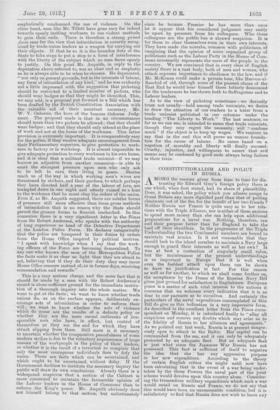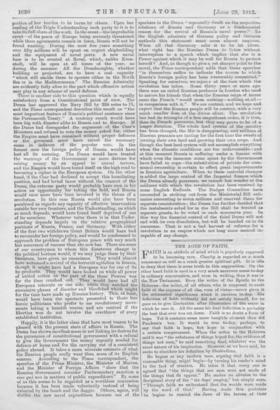CONSTITUTIONALISM AND POLICY IN RUSSIA. A MONG the reasons given from
time to time for dis- trusting Sir Edward Grey's foreign policy there is one which, when first stated, had its share of plausibility. Does, it was asked, the policy which you admire assign to Great Britain any more dignified part than that of pulling chestnuts out of the fire for the benefit of her two friends ? Neither Russia nor France is quite easy as to her rela- tions with the Triple Alliance, nor is either of them anxious to spend more money than she can help upon additional preparations for a naval war. Nothing, therefore, can suit their purpose better than for England to take the load off their shoulders. In the programme of the Triple Understanding the two Continental members are bound, to maintain vast armies. Is it not reasonable that they should look to the island member to maintain a Navy large enough to guard their interests as well as her own ? It was at best a contention of singularly small value, but the maintenance of the present understandings is so important to Europe that it is well when even the feeblest attack upon them can be shown to have no justification in fact. For this reason as well as for another, to which we shall come further on, the acceptance by the Duma of the Russian Navy Bill gives just ground for satisfaction to Englishmen. European peace is a matter of such vital interest to the nations it concerns that we welcome every indication that it is as dear to our partners as to ourselves. And certainly the particulars of the naval expenditure contemplated in this Bill do give us this indication in a very impressive form. As described in the excellent letter from the Times corre- spondent on Monday, it is calculated finally to "allay all suspicions and remove any doubts which may arise as to the fidelity of Russia to her alliances and agreements." As we pointed out last week, Russia is at present danger- ously open to attack in the Baltic. Her capital can. be commanded from the sea, and it can only be adequately protected by an adequate fleet. But an adequate fleet is just what since the Japanese War Russia has not possessed. This fact is sufficient of itself to negative the idea that she has any aggressive purpose in her new expenditure. According to the theory of certain English critics she might until now have been calculating that in the event of a war being under- taken by the three Powers the naval part of the joint scheme would devolve upon this country alone. Consider- ing the tremendous military expenditure which such a war would entail on Russia and France, we do not say that this would have been an unreasonable condition, but it is satisfactory to find that Russia does not wish to leave any portion of her burden to be borne by others. Upon her reading of the Triple Understanding each party to it is to take its full share of the work. In the event —the improbable event—of the peace of Europe being seriously threatened while those agreements remain in force, Russia will not be found wanting. 'During the next five years something over fifty millions will be spent on urgent shipbuilding and the equipment of naval ports. A new naval base is to be created at Revel, which, unlike /iron- stadt, will be open at all times of the year, as during the summer. All the Dreadnoughts, whether building or projected, are to have a coal capacity "which will enable them to operate either in the North Sea or in the Mediterranean." The Russian Admiralty are evidently fully alive to the part which offensive action may play in any scheme of naval defence.
There is another side to this question which is equally satisfactory from a Constitutional point of view. The Puma has approved the Navy Bill by 228 votes to 71, and the Times correspondent describes this result as "the 'nest important feature of Russia's political existence since the Portsmouth Treaty." A contrary result would have been big with disaster alike to Russia and to Europe. If the Puma had disregarded the argument of the Czar's Ministers and refused to vote the money asked for, either the Empire must have remained without proper defences or the governed must have raised the necessary sums in defiance of the popular vote. In the former ease the foreign policy of Russia would have lost all its meaning. The Puma would have treated the warnings of the Government as more devices for raising money by an appeal to unreal terrors, and the Empire would have found itself on the high road to becoming a cipher in the European system. On the other hand, if the Czar had declined to accept this humiliating position, and had levied taxes without the consent of the Puma, the extreme party would probably have seen in his action an opportunity for taking the field, and Russia, Would once more have 'been involved in the throes of a revolution. In this case Russia would also have been paralysed as regards any capacity of effective intervention outside her own frontiers, and the Understanding, on which no much depends, would have found itself deprived of one of its members. Whatever value there is in that Under- standing depends largely on the relative geographical positions of Russia, France, and Germany. With either of the first two withdrawn Great Britain would have had to reconsider her foreign policy, and would be condemned to approach the problem of European peace with very much less assurance of success than she now has. There are some of our countrymen to whom this disastrous change in the political horizon would, if we may judge them by their literature, have given no uneasiness. They would almost have welcomed a revival of the terrorist agitation in Russia, though it might have had a European war for one of its by-products. They would have looked on while all power of united action on the part of the three Powers was for the time crushed out. They would have had all European interests on one side, while they watched the successive phases of disorder and bloodshed which might for the time have made up Russian history. This, at least, avonld have been the spectacle presented to those less heroic politicians who prefer to see revolutionary move- Monts taking a humble course, and are content if the liberties won do not involve the overthrow of every established institution.
Happily, it is the latter class that have most reason to be pleased with the present state of affairs in Russia. The Puma has shown excellent sense in not linking its desires for the pursuance of constitutional government with a refusal to give the Government the money urgently needed for defence at home and for the carrying out of a consistent policy abroad. It takes a more accurate estimate of what the Russian people really want than some of its English censors. According to the Times correspondent, the speeches of the Prime Minister' the Minister of Marine, and the Minister of Foreign Affairs "show that the Russian Government consider Parliamentary sanction a sine pal non in matters of public expenditure." By some of us this seems to be regarded as a, worthless concession because it has been made voluntarily instead of being extorted by the bomb and the dagger. Others, again, will dislike the new naval expenditure because one of the speakers in the Puma " repeatedly dwelt on the respective relations of Russia and Germany as a fundamental reason for the revival of Russia's naval power." 'fa the English admirers of German policy and German, methods this statement must seem almost impious.. When all that Germany asks is to be let alone, what right has the Russian Puma to listen without interruption to a. speech which implies that she is a,. Power against which it may be well for Russia to protect herself P And, as though to give a yet sharper point to the moral, the Times correspondent adds that these speeches "in themselves suffice to indicate the course to which Russia's foreign policy has been irrevocably committed."' Speaking for ourselves, we rejoice at the turn which the revolution has taken. Some thirty years or more ago there was an exiled Russian professor in London who used to assure his friends that when the Russian reign of terror came the French" would seem nothing—nothing at all— in comparison with it." We are content, and we hope and expect that the Russian people will be content, with a very much smaller dose of the divine elixir. The revolution has had its triumphs of a less magnificent order, it is true, than its French precursor, but they may prove to be of a. longer duration.. The whole land system of the country has been changed, the Mir is disappearing, and millions of Russian peasants are tasting for the first time the sweets of :owning their own Land and growing their own crops. And though the best land system will not accomplish everything when the climatic conditions are too unfavourable—and at this moment Russia is suffering under a famine with which even the immense sums spent by the Government. have failed to cope—the substitution of private for com- munal ownership is certain to effect great improvements in Russian agriculture. When to these material changes is added the largo control of the Imperial finance which the Mama already possesses, we cannot but wonder at the coldness with which the revolution has been received by some English Radicals. The Budget Committee have succeeded in striking out from the Ministerial Bill esti- mates amounting to seven millions and reserved them for separate consideration ; the Dunia, has further decided that the instalments asked for in the Bill shall be treated as separate grants, to be voted in each successive year In this way the financial control of the third Puma will not end with its own dissolution, but will be handed on to its successor. That is not a. bad. harvest of reforms for a. revolution in an empire which not long since seemed in- capable of any change.























































 Previous page
Previous page